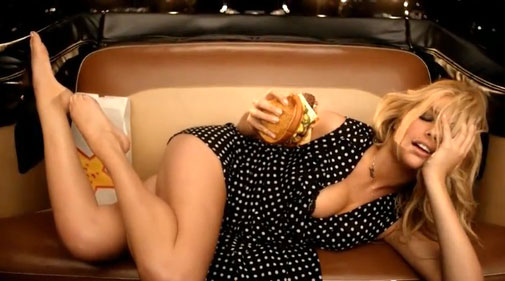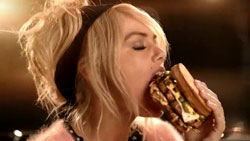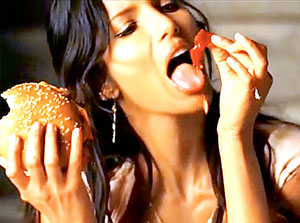
Welcome to Burger Kink. May I take your order?
 You can have it your way, or one of our hot and juicy sandwiches will have its way with you.
You can have it your way, or one of our hot and juicy sandwiches will have its way with you.
Would you like fries with that? A shake? A condom?
Okay, you got me. I'm faking it. These are slogans I made up, inspired by a current TV commercial for Hardee's, the fast-food chain formerly best known for its hot, moist, mouthwatering biscuits, not its hooooott, mooiist, ooooh, mouthwatering cupcakes.
Alexander Portnoy has nothing on Hardee's...
The perpetually horny protagonist of Philip Roth's best-selling 1969 novel, Portnoy's Complaint, told his shrink all about his masturbatory fantasies, including an infamous youthful encounter with a sirloin.

The commercial I'm talking about, in regular rotation at various times of day since its Super Bowl unveiling, depicts swimsuit model and actress Kate Upton on a steamy drive-in movie date with one of Hardee's jalapeno-topped Southwest Patty Melts.
The ad sets a new standard for sexualizing food by selling it as -- pardon the expression -- a happy meal. It goes beyond an earlier sandwich-orgy Hardee's commercial from 2009, featuring model Padma Lakshmi (at right) having her way with a Western Bacon Thick Burger.
This new Hardee's ad opens on a nostalgic 1950s drive-in movie tableau, cars neatly lined up in rows alongside speaker posts. Upton is sitting in a convertible, seemingly alone.

She pulls a thick, glistening sandwich from a Hardee's take-out bag on the front seat and opens her mouth really wide to take a sensuous bite. The sandwich makes her hot. She's soon wiping beads of sweat from around her neck and loosening her top, while the camera rises above her to get a National Geographic shot of her cleavage.
Next there's a shot of her rapturously gnawing on the sandwich while holding the Hardee's bag between her black-stocking'ed and gartered thighs. A quick jump cut, and she's in the back seat, on her back, legs up, writhing as she savors the juices.
It's all over in 30 seconds -- which, given the target audience, is probably just about right.

Hint: This particular commercial is not aimed at persuading women who look like Upton to endanger their coltish figures. The message would appear to be, "Hey, boys, you have next to no chance of ever having sex with a woman who looks like Upton unless you save your money and pay for it. But you can satisfy your hunger with one of these salacious sandwiches she has blessed."
The commercial is so over the top, it's almost laughable. But only almost.
Radio commentator Rush Limbaugh has earned himself a costly backlash with his vulgar, misogynist remarks about a young woman who gave testimony in support of mandatory insurance coverage of birth control. Yet the fact is, demeaning and objectifying women, though commonplace in advertising, goes largely unremarked, much less rebuked or boycotted.

Go Daddy, a.k.a. Gonaddy, is notorious for advertising its Internet services with slinky honeys who would seem perfectly at home, and appropriately dressed, for a come-hither Victoria's Secret lingerie commercial.
Burger King seemed to be moving into Burger Kink territory itself a while back, with a print ad in which a young woman was about to wrap her mouth around a "super seven incher" that supposedly would "BLOW" her mind -- and, presumably, yours.
Chipotle has advertised phallic burritos "big enough to ride."
And even good old Mickey D's has gotten into the suggestive market, with ads for its double cheeseburger. "I'd hit it," says a burger hound in the ad.
Strangely enough, commercials for erectile dysfunction treatments like Cialis are downright demure, compared to the hot and heavy pitches for burgers, beer, cars and such. The emphasis is on romance, not doing the do. The twin tubs thing is positively 1950s-retro.

I'm not trying to launch a campaign to ban commercials like the onanistic Hardee's spots. It's an example of the private sector of our economy hard at work selling products, creating jobs.
But I would like to make a modest proposal that speaks to both the possible consequences of sexual marketing and the ongoing controversy about insurance coverage of birth control.
Why not levy a tax on companies that insist on using soft-core porn to sell their products, and use those tax revenues to subsidize birth control? If the businesses don't want to pay the tax, they can stop making the commercials.
One way or another, we should see a decrease in unwanted pregnancies.